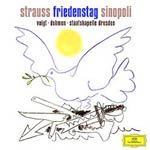
Strauss, Richard - Der Friedenstag (Complete Opera)
 $32.39
Special Order
$32.39
Special Order3 - 6 weeks add to cart
Strauss, Richard - Der Friedenstag (Complete Opera)
Deborah Voigt - Johan Botha - Jon Villars, Staatskapelle Dresden, Sinopoli
[ Deutsche Grammophon / CD ]
Release Date: Monday 15 October 2001
This item is only available to us via Special Order. We should be able to get it to you in 3 - 6 weeks from when you order it.
Richard Strauss´s underrated and underrecorded opera 'Friedenstag'
Richard Strauss´s underrated and underrecorded opera Friedenstag is the final release with the late Giuseppe Sinopoli on DGG and the last recorded document of his exceptionally successful collaboration with the Staatskapelle Dresden, one of the most distinguished and authentic Strauss orchestras in the world.
- The music of the one-act opera Friedenstag is quite different from most of what Strauss wrote at that time. Instead of harking back to romanticism, as in Arabella and Daphne, he composed here in a tougher style more in keeping with his own time, bringing into play Hindemithian, even Bergian ideas. The opening to the final optimistic ensemble aims at echoing the end of Fidelio. The score is austere and strongly diatonic, its sombreness relieved only by the Piedmontese youth´s Italian aria and the long soprano aria for the Commandant's wife Maria.
- The opera is set in a besieged city on the last day of the Thirty Years´ War in 1648 and was first heard in 1938, barely a year before the outbreak of the Second World War. What matters is the passion and sincerity of the relationship between the seemingly strict, militaristic Commandant and his wife Maria, starved of love and affection as her husband devotes all his energies to carrying out his function in the war.
- Beside Giuseppe Sinopoli, the excellent Staatskapelle Dresden and the impressive Chorus of the Semperoper, the main protagonists of t his recording are the internationally acclaimed Deborah Voigt and Albert Dohmen; both also sing in Sinopoli´s last opera recording,
Ariadne auf Naxos, released on Deutsche Grammophon in August.
- Voigt glories in the lirico spinto part of Maria, singing with vibrant tone and providing the necessary ecstasy in the finale. Dohmen, a worthy successor to Hans Hotter, for whom the part of the Commandant was originally written, gives this character the right sense of a man dedicated to his role of defending his emperor's cause and honour at whatever cost to his men or to his personal life. Johan Botha as a notable Piedmontese and a team of Dresden stalwarts from the performances in the Semperoper fill the smaller roles perfectly.
